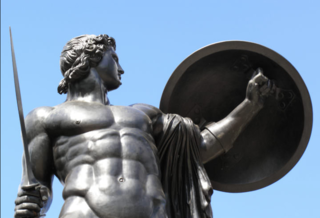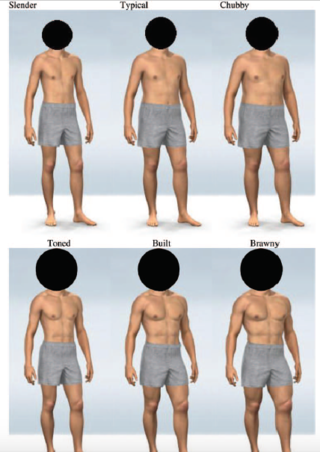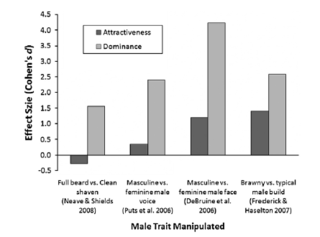Sex
5 Reasons Both Women and Men Care About Big Muscles
2. Women appreciate them; men are intimidated by them.
Posted July 20, 2019 Reviewed by Davia Sills
Key points
- In a study, women reported that their short-term sexual partners were more muscular than their other partners.
- Researchers have found that a man’s physical formidability is a better predictor than his attractiveness for how many partners he has had.
- While bigger muscles might not be highly attractive to women, they’re certainly intimidating to male sexual competitors.

1. Muscularity is sexy.
In a paper titled “Why Is Muscularity Sexy? Tests of the Fitness Indicator Hypothesis,” researchers Martie Haselton and David Frederick asked 141 women to rate different male body types.
Here are women’s average ratings for each male body type in terms of sexual attractiveness (on a scale of 1 to 9):
Built: 6.97
Toned: 6.87
Brawny: 6.37
Slender: 5.42
Typical: 4.28
Chubby: 2.95
In a separate study, women reported that their short-term sexual partners were more muscular than their other partners. The researchers suggest women have fewer requirements for muscular men.
They write, “women were more willing to have short-term relations with muscular men without the requirement that they demonstrate characteristics particularly desired in long-term mates (trustworthiness, emotional closeness, etc.), possibly because these men possessed physical indicators of genetic fitness.”

The researchers then asked a group of male participants about their sexual history. Controlling for age and body fat, muscular men reported greater numbers of sexual partners.
Interestingly, the researchers also asked men about their self-esteem. Maybe muscular men simply feel better about themselves. This higher-self esteem could explain their higher sexual success. But the evidence didn’t support this.
Muscular men, regardless of their self-esteem, had more sexual partners. Finally, researchers asked a different group of men, “How many times have you had sex with a woman who had a boyfriend or husband at the time you had sex with her?” Muscular men reported more affairs with women who were in committed relationships.
2. Women like muscles; men are intimidated by them.
Researchers have found that a man’s physical formidability is a better predictor than his attractiveness for how many partners he has had.
In the study, researchers recorded short videos of 157 different men. Next, another group of men watched these videos. Researchers asked them a question about each of the men in the videos: “How likely is it that this man would win a physical fight with another man?” They used a scale ranging from “extremely likely” to “extremely unlikely.”
A group of women also viewed the videos. They responded to a question about each of the men: “How sexually attractive is this man?” They used a scale ranging from “extremely unattractive” to “extremely attractive.”
Eighteen months later, the men in the videos completed a questionnaire asking about their sexual history over the 18 months. How tough a guy looked to men predicted his reported mating success better than how attractive he looked to women. The researchers concluded, “Men with higher physical dominance, but not sexual attractiveness, reported higher quantitative mating success.”
In fact, some evolutionary psychologists have argued that throughout human history, dominance has been more important than attractiveness for men’s mating success.
Take beards. Evidence is mixed about whether women find beards attractive. Some women like them, others don’t, and for others it depends. But there is clear evidence that men view other men with beards as more intimidating than clean-shaven men.
Or take deep voices. Women are likely to think deep voices are attractive. But in comparison, men are even more likely to think deep voices are intimidating.
In a widely-cited paper titled, “Beauty and the beast: mechanisms of sexual selection in humans,” David Puts presents evidence suggesting that male competition has had a stronger effect than female selection on male physical traits.
Male competition has given rise to male traits like strong muscles, deep voices, and facial hair. Men evolved these traits not so much because women find them sexy, but more because other men find them intimidating.

3. Muscles are indicators of health and fitness.
In a new paper titled “Men’s Bodily Attractiveness: Muscles as Fitness Indicators,” researchers led by Patrick K. Durkee the University of Texas at Austin collected responses from 503 women and 942 men.
They wanted to estimate women’s and men’s size preferences for each muscle. They found that overall, men and women think bigger muscles are more attractive than smaller ones.
But some muscles are viewed as more important than others. The top five muscles in order of size preference, as rated by women, include:
- Obliques
- Glutes
- Abs
- Biceps
- Shoulders
Researchers suggest "women prefer muscles that are hard to build to be larger than muscles that are easier to build." Interestingly, men’s ratings of size preferences were larger than women’s. In other words, men thought bigger muscles were better, while women didn’t have quite the same preferences. They wanted big muscles, but not too big.
This sex difference may be in part due to the findings above revealing that dominance (rated by men) is more important than attractiveness (rated by women) for sexual success. Bigger muscles might not be highly attractive to women, but they’re certainly intimidating to male sexual competitors.
4. Muscles attract attention.
Both women and men take greater notice of men who look strong. Researchers have found that, with all else equal, people spend more time looking at individuals who look more formidable (strong, able to impose physical costs).
They suggest that formidability may be a feature of others that the human mind has evolved to detect, in the same way that we have evolved to automatically encode people’s age and sex when we first meet them.
Furthermore, people can instantly and accurately assess the formidability of others. The same group of researchers collected photos of 64 men, as well as measures of their handgrip strength.
Next, they showed shirtless photos of these 64 men to 187 participants. The participants looked at the photos and then provided their ratings of how strong they thought the men were.
Researchers found that after viewing each image for only 33 milliseconds (about 0.03 seconds), participants’ ratings of how strong the men looked were correlated with how strong the men actually were, as revealed by their handgrip strength measures. People instantly and accurately estimated how strong the men were.
The researchers suggest, "formidability may begin to influence the course of social interactions almost as soon as they have begun.”
5. Strength correlates with health.
In a study on cardiovascular (heart) disease, researchers collected data from 1,104 male firefighters over the course of 10 years. They found that men who were able to do 40 push-ups or more had a 96 percent reduced risk of heart disease compared with men who could do less than 10 push-ups.
Perhaps more surprisingly, push-ups were a stronger predictor of whether a person would get cardiovascular disease than an aerobic treadmill test.
40 push-ups are much more than what the typical college-aged male can do. One study found the average male in college is capable of between 18 to 26 push-ups.
Facebook image: George Rudy/Shutterstock




